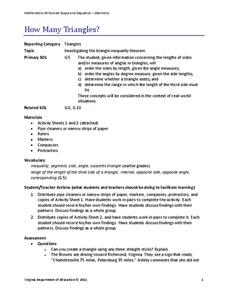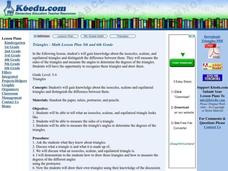EngageNY
Solving for Unknown Angles Using Equations II
The third activity in the series of 29 asks learners to identify types of angles to verify angle relationships. They find unknown measures using vertical, adjacent, complementary, supplementary, and 360-degree angles.
Alabama Learning Exchange
Radians: Just Another Way
Serve up angle measurements on paper plates. Pupils use paper plates and paper-folding techniques to create a unit circle with conversions for special angles. Using their plates, learners explore the relationship between angle...
EngageNY
Conditions on Measurements That Determine a Triangle
Can any three side lengths create a triangle? Your classes tackle this question and more in the 11th lesson of the 29-part module. Through modeling with patty paper, individuals discover the relationship between the lengths of the sides...
Virginia Department of Education
Angles in Polygons
Polygons — it's all about the angles. Groups work with dynamic geometry software to find the sum of the measures of the angles of various polygons. After finding the information for several polygons, the groups generate a formula that...
Virginia Department of Education
How Many Triangles?
Something for young mathematicians to remember: the sum of any two sides must be greater than the third. Class members investigates the Triangle Inequality Theorem to find the relationship between the sides of a triangle. At the...
Curated OER
Transformations in the Coordinate Plane
Your learners connect the new concepts of transformations in the coordinate plane to their previous knowledge using the solid vocabulary development in this unit. Like a foreign language, mathematics has its own set of vocabulary terms...
Curated OER
Why Does ASA Work?
Your geometry learners explore Angle-Side-Angle congruence in this collaborative task. The sum of the interior angles of all triangles being one hundred eighty degrees, is the key learners will discover as they explain their reasoning...
National Security Agency
Partying with Proportions and Percents
Examine ratios and proportions in several real-world scenarios. Children will calculate unit rates, work with proportions and percentages as they plan a party, purchase produce, and take a tally. This lesson plan recommends five...
Curated OER
Tessellation
Students create an art piece incorporating tessellating shapes, translational symmetry, reflectional symmetry,and or rotational symmetry. They are asked if they know the definition of tessellation. If so, students are asked what shapes...
Curated OER
Frictionally Speaking
Second graders investigate friction by pulling a cup of marbles across a variety of surfaces, without the marbles spilling out.
Curated OER
High School Mathematics Problems from Alaska: Azimuth and Arc Length
Students track the Azimuth sunrise and sunset over time by creating a chart.
Curated OER
Triangles
Young scholars discover the difference between triangles. In this triangle lesson plan, students discuss the different types of triangles, then draw the three different types of triangles. The teacher will draw, or model, how to draw...
Curated OER
Water Quality Monitoring
Learners comprehend the four parameters of water quality. They perform tests for salinity, dissolved oxygen, pH and clarity or turbidity. Students comprehend why scientists and environmental managers monitor water uality and aquatic...












